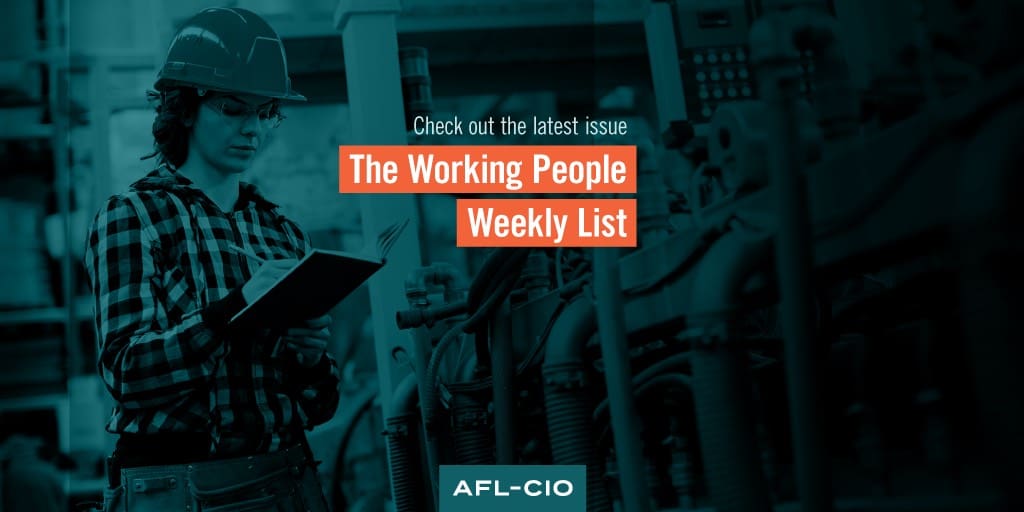Vote for Candidates Who Support Workers’ Rights: The Working People Weekly List

Every week, we bring you a roundup of the top news and commentary about issues and events important to working families. Here’s the latest edition of the Working People Weekly List.
IATSE President Matthew Loeb Urges Members to Vote for Candidates Who Support Workers’ Rights and to Contribute to Union’s Political Action Committee: “IATSE president Matthew Loeb is urging his members to get out and vote in the upcoming midterm elections and to contribute to the union’s political action committee, which overwhelmingly supports Democratic candidates for federal office. ‘We are now faced with yet another of the most consequential elections in our history this November,’ Loeb wrote in his latest newsletter. ‘Those we elect will decide the fate of legislation on reproductive rights…and impact the course of history in our fight for human rights. In the face of a direct attack on personal freedoms, it’s easy to conclude that voting isn’t enough, and rather that entire institutions need to be rebuilt. That may be, but we know lives will be impacted before that, and to abstain from voting is to forgo one of the few immediate means of protection for ourselves and our kin.”
The Aging Student Debtors of America: “‘Years and years of erosion of labor rights has meant that wage power has not kept up with student debt,’ Randi Weingarten, the president of the American Federation of Teachers, told me. As such, student loans don’t take people out of the working class; they merely change the accounting of people living within it. Fifty-year-old David Ormsby, for example, had been working at a Home Depot in Detroit for eight years when he decided to go back to school. ‘I wouldn’t call it a dead-end job,’ he said, but he felt he wouldn’t be able to advance without a higher degree. In 2005, he began studying part time at a local university for a bachelor’s degree in supply-chain management, while also raising his two sons and working more than fifty hours a week. Today, he holds close to ninety thousand dollars in student debt.”
Lorena Gonzalez Sworn In as Head of California Labor Federation: “Former San Diego Assemblymember Lorena Gonzalez took the helm of the California Labor Federation on Wednesday, announcing new initiatives for the organization. Gonzalez was sworn in around noon as executive secretary-treasurer of the federation at its convention in San Francisco, more than six months after stepping down from her Assembly seat to head it.”
Shakespeare Theatre Production Staff Hold Vote on Unionization: “The stagehands, costume and set designers, electricians, audio engineers, and other production staffers at Shakespeare Theatre Company voted to unionize Monday, the result of an organizing effort that began years ago and intensified amid allegations of unfair labor practices during the pandemic. The theater company’s employees voted 23 in favor and 6 against, with a mix of in-person and mailed-in ballots counted by the National Labor Relations Board. The group is represented by IATSE Local 22, the local stagehands union.”
Book Soup, West Hollywood’s Storied Bookstore, Unionizes Amid a Larger Organizing Wave: “The employees of Book Soup, West Hollywood’s self-proclaimed ‘bookseller to the great and infamous,’ are embarking on a new chapter as members of a union. Last month Vroman’s, which owns the bookstore, voluntarily recognized its employees’ union, marking a big victory for the dozen or so booksellers who will be represented. Victor Serrano, organizing coordinator for the Communications Workers of America District 9, with which Book Soup’s union is affiliated, said unionizing at smaller businesses like independent bookstores is a relatively new phenomenon.”
Ohio Companies Pay CEOs Over Workers by Factors of Hundreds: “At least eighteen Ohio companies pay their CEO more than 100 times what they pay their median worker, a new report shows. Those companies pay their CEOs an average of more than $14.5 million per year, according to a report compiling financial data produced by the AFL-CIO, a trade union that advocates for higher worker wages. Those same businesses pay workers a median of about $66,000. In a speech last week, AFL-CIO Secretary Treasurer Fred Redmond characterized the trend as ‘greedflation,’ arguing corporate profit secret behavior is to blame for the inflationary economy. ‘The ‘heroes’ of the pandemic—and by heroes I mean the working people who showed up and risked their lives and health and safety to keep our country running—are still showing up and working around the clock, but working for less,’ he said.”
Young Workers Are Bridging the Climate and Labor Movements: “In June, the AFL-CIO, the largest federation of unions in the U.S., issued a resolution to launch a young workers program, intended to be a hub for empowering young workers with access to existing union infrastructure through its affiliated state federations and central labor councils. ‘Young workers are organizing from the ground up, leading high-profile campaigns around the country and winning,’ Liz Shuler, AFL-CIO president, told Truthout in a statement, of the federation’s decision to revamp a version of what it began in 2009. ‘Young workers report the economic status quo is working against them, and when they look for answers, they see collective action through labor organizing as the solution,’ Shuler said. In addition to training and mobilizing more young organizers, the initiative will plug into legislative efforts around student debt and affirming college athletes’ right to organize and promote collective bargaining education efforts in high schools.”
Here Are the 20 Companies with the Biggest Pay Gap Between CEOs and Workers in 2021, Including Amazon, Apple, Starbucks, and McDonald’s: “Pay disparities between CEOs and workers at some of the world’s biggest companies grew even bigger last year, a new report says. In 2021, the average S&P 500 CEO made 324 times what their company’s average worker made, according to a report published Monday by the AFL-CIO. That’s up from 299-to-1 in 2020.”
Kenneth Quinnell
Mon, 08/01/2022 – 14:26